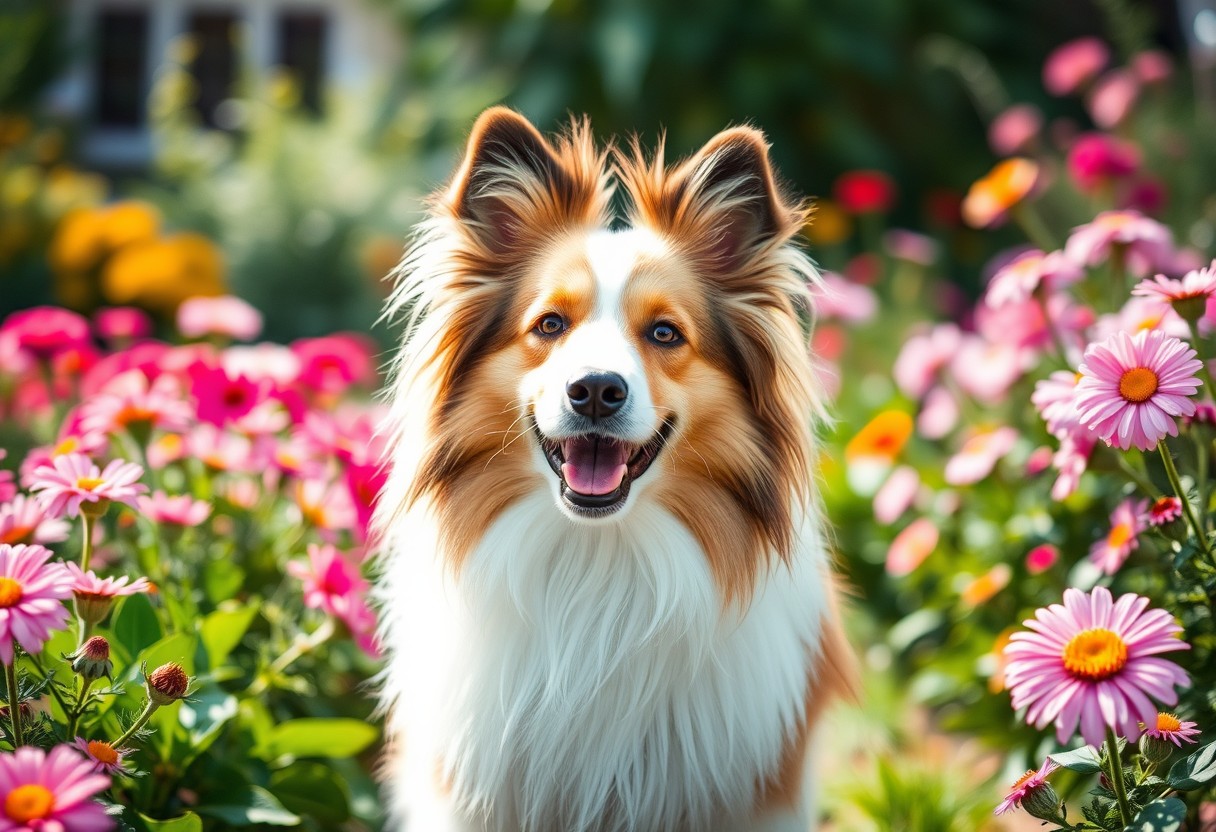How Long Do Shelties Normally Live? Lifespan Information

You may be curious about how long your beloved Sheltie is likely to live. Understanding the average lifespan of Shetland Sheepdogs can help you provide the best care throughout their life. Typically, Shelties live between 12 to 15 years, but factors like genetics, diet, and exercise play a crucial role in their longevity. Regular veterinarian check-ups and a healthy lifestyle can significantly enhance your furry friend’s lifespan, ensuring they stay vibrant and active for many joyful years together!

Key Takeaways:
- Average Lifespan: Shetland Sheepdogs, commonly known as Shelties, typically live between 12 to 15 years, depending on factors like genetics and overall health.
- Influencing Factors: Various elements such as diet, exercise, regular veterinary care, and living conditions can significantly impact a Sheltie’s lifespan.
- Health Monitoring: Routine health checks and attention to common breed-specific health issues, such as hip dysplasia and progressive retinal atrophy, are crucial for extending their life expectancy.
Understanding Sheltie Lifespan
A Shetland Sheepdog, or Sheltie, is known for its lively personality and affectionate temperament. Understanding their lifespan is crucial for any potential owner or current caregiver. The average lifespan of Shelties can vary based on several factors, which can be imperative in ensuring you provide the best care for your furry companion.
Average Lifespan of Shelties
To give you a general idea, the average lifespan of Shelties ranges from 12 to 15 years. However, with proper care, some can live even longer. Regular vet check-ups, a balanced diet, and exercise can all contribute to extending your Sheltie’s life, allowing you to create even more cherished memories together.
Factors Affecting Lifespan
Lifespan for your Sheltie can be influenced by various factors, including genetics, health conditions, and lifestyle choices. Make sure to consider the following aspects to help enhance your dog’s longevity:
- Genetics – A breed’s genetic disposition can lead to health vulnerabilities.
- Diet and Nutrition – A well-balanced diet fuels your Sheltie’s health.
- Exercise – Regular physical activity maintains their strength and vigor.
- Veterinary Care – Routine check-ups catch health issues early.
- Environment – A safe and loving home contributes positively to their wellbeing.
Assume that by being proactive about these factors, you can significantly influence your Sheltie’s health and happiness.
Factors affecting the lifespan of your Sheltie include obvious ones like nutrition but also less discussed ones, such as mental stimulation. Aging, alongside genetic disorders, can also lead to increased susceptibility to diseases. Regular physical and mental exercise is vital; after all, a well-engaged dog is often a healthier dog. Your commitment to providing a healthy lifestyle is crucial, so assume that prioritizing these aspects can lead to a longer, happier life for your beloved Sheltie.
- Health Screenings – Early detection of potential problems can lead to better outcomes.
- Socialization – Engaging with other dogs helps your Sheltie’s emotional health.
- Stress Levels – Keeping your Sheltie in a calm environment is beneficial.
Assume that by focusing on these elements, you’re helping to ensure a longer, healthier life for your furry friend.
Common Health Issues in Shelties
The Shetland Sheepdog, or Sheltie, is generally a healthy breed, but they can be prone to certain health issues. Some common concerns include hip dysplasia, eye problems like cataracts and progressive retinal atrophy, and skin conditions such as allergies. Regular check-ups and prompt attention to any abnormalities can help keep your Sheltie healthy and happy throughout their life.
Genetic Concerns
For Shelties, it’s crucial to be aware of genetic predispositions that can affect their health. Breeding practices can influence the likelihood of developing specific conditions, so choosing a reputable breeder who screens for issues like hip dysplasia and genetic eye diseases can greatly enhance your dog’s quality of life.
Preventative Care
The best way to ensure the long, happy life of your Sheltie is through proper preventative care. Regular veterinary check-ups, a balanced diet, and sufficient exercise are crucial in catching potential health issues early. Make sure to keep your Sheltie’s vaccinations up to date and consider routine screenings for genetic conditions, as these can significantly impact their overall health.
Care for your Sheltie involves being proactive about their health needs. Regular veterinary visits not only help you keep track of vaccinations but also enable early detection of any health concerns. Nutrition plays a vital role, so feed your Sheltie a high-quality diet tailored to their age, size, and activity level. Exercise is equally important; ensure they have a routine that keeps them physically fit and mentally stimulated. By staying informed and actively involved in your Sheltie’s wellness, you can help them live a longer, healthier life.

Nutrition and Diet for Longevity
Keep in mind that a balanced and nutritious diet plays a crucial role in extending your Sheltie’s lifespan. Providing your furry friend with wholesome meals rich in necessary nutrients enhances their overall health and wellbeing. Incorporating a variety of high-quality ingredients will help them maintain a healthy weight and avoid potential health issues, thus promoting a longer and happier life.
Essential Nutrients
One of the keys to ensuring your Sheltie lives a long, healthy life is to provide them with a diet rich in necessary nutrients. These include proteins for muscle development, healthy fats for energy, vitamins and minerals for immune support, and carbohydrates for daily energy needs. Prioritizing high-quality food that contains real ingredients will help your dog thrive.
Feeding Tips
Tips for feeding your Sheltie properly include:
- Choose high-quality dog food specifically designed for their size and age.
- Monitor their weight to prevent obesity.
- Provide fresh water at all times.
- Incorporate fruits and vegetables as healthy treats.
The right nutrition is vital for your Sheltie’s health, helping to prevent common health problems.
Essentially, your Sheltie’s diet should consist of well-balanced meals to promote long-term health. Pay attention to their specific dietary requirements, as Shelties can have different nutritional needs compared to other breeds. Regularly consult with your veterinarian to tailor their diet accordingly, ensuring you’re aware of any food allergies or sensitivities they may have. The key to longevity lies in the choices you make regarding your Sheltie’s nutrition!

Exercise and Activity Needs
Once again, it’s crucial to understand that your Sheltie is an active and playful breed that thrives on regular exercise and activity. Incorporating daily physical activities not only helps maintain a healthy weight but also supports their overall well-being. Aim for a combination of walks, playtime, and engaging games to keep your furry friend happy and energized!
Daily Exercise Recommendations
An ideal daily routine for your Sheltie includes at least 60 minutes of exercise. This can be broken down into several shorter sessions, including brisk walks, fetch, and agility training. By mixing up their activities, you ensure your Sheltie remains physically fit and mentally stimulated!
Mental Stimulation
An equally important aspect of your Sheltie’s routine is mental stimulation. Engage your pup with puzzle toys, obedience training, and interactive games that challenge their brains. This helps sharpen their cognitive skills and combats boredom, which can lead to undesirable behaviors.
Needs for mental stimulation are important in keeping your Sheltie happy and well-adjusted. Regular activities that require problem-solving and engagement will allow your dog to use their natural instincts in a positive way. Consider incorporating interactive toys, reward-based training, and social playdates with other dogs to enhance their mental workout. Note, a challenged Sheltie is a happy Sheltie! Make it a priority to keep their mind sharp, and you’ll both enjoy a loving bond for years to come.
Grooming and Care Tips
After bringing a Sheltie into your home, proper grooming and care become vital for their overall well-being. To keep your furry friend healthy and happy, consider the following tips:
- Brush their coat regularly to reduce shedding.
- Trim their nails to maintain paw health.
- Bath them as needed, but avoid overbathing.
- Keep their ears clean and dry.
The right grooming routine not only enhances their appearance but also strengthens your bond.
Coat Maintenance
One of the most important aspects of Sheltie care is maintaining their beautiful double coat. Regular brushing, ideally several times a week, helps to prevent matting and reduces shedding. During shedding seasons, daily brushing can be beneficial to keep loose fur under control and to promote healthy skin. Don’t forget to pay attention to their undercoat, as it can trap dirt and debris if not cared for properly.
Regular Veterinary Check-ups
Coat health is intertwined with your Sheltie’s overall wellness, which is why regular veterinary check-ups are critical. These visits allow you to stay ahead of any potential health issues. Ensuring vaccinations are up to date and your Sheltie undergoes routine examinations are vital for early detection of dangerous conditions such as hip dysplasia and certain genetic disorders. Additionally, your vet can provide you with tailored dietary advice to maintain your Sheltie’s optimum health. Consistent care from a veterinarian not only extends your pet’s lifespan but also ensures they lead a happy, active life.
To keep your Sheltie thriving, make it a priority to schedule and attend regular veterinary check-ups. These vital appointments can help to identify any emerging health issues before they become serious problems, thus ensuring your companion enjoys a longer and healthier life. Do not forget, staying vigilant about their health enhances your pet’s quality of life and strengthens the bond you share.
Adopting a Sheltie: What to Consider
Now that you’re considering welcoming a Sheltie into your home, it’s important to think about their unique needs and characteristics. Shelties are intelligent and energetic, requiring regular exercise, mental stimulation, and social interaction. Additionally, you should assess your lifestyle and environment to determine if they will thrive in your household. Ensure you have the time, resources, and commitment to care for a Sheltie, especially if considering adopting a senior dog.
Lifespan Expectations
Consider that Shelties typically live between 12 to 15 years, with some even reaching 16 years or more, depending on genetics and care. By being proactive about their health and wellness, you can help your Sheltie enjoy a longer, healthier life.
Caring for a Senior Sheltie
Adopting a senior Sheltie can be a rewarding experience that comes with its own set of responsibilities. Senior dogs often require more frequent vet visits, special diets, and adjustments to their exercise routines. Be prepared to accommodate their changing energy levels and possibly address age-related health issues like arthritis and vision impairment. Providing them with a comfortable living space and plenty of love is crucial during this time.
Understanding the needs of a senior Sheltie means recognizing that their health requirements may change drastically as they age. Regular check-ups with a veterinarian are vital to monitor their health and to catch any issues early on. Additionally, providing joint supplements and an appropriate diet can greatly benefit their overall well-being. You’ll also need to adjust exercise routines; instead of long walks, you might find short, frequent walks are more beneficial. Most importantly, showering your senior Sheltie with patience and affection will ensure their golden years are spent happily with you.
Final Words
Following this, it’s important to remember that the average lifespan of a Shetland Sheepdog is around 12 to 14 years. By providing your dog with a healthy diet, regular exercise, and routine veterinary care, you can help ensure that your beloved Sheltie enjoys a long, happy life by your side. Cherish every moment with your furry friend, as they bring so much joy and love into your life!
FAQ
Q: What is the average lifespan of a Shetland Sheepdog (Sheltie)?
A: The average lifespan of a Shetland Sheepdog is typically between 12 to 15 years. However, with proper care, regular veterinary check-ups, and a healthy diet, some Shelties can live even longer, reaching 16 years or more. Genetics, lifestyle, and overall health play significant roles in determining the lifespan of an individual dog.
Q: What factors can affect the lifespan of Shelties?
A: Several factors can influence the lifespan of Shelties, including genetics, health conditions, diet, exercise, and living environment. Common health issues in Shelties, such as hip dysplasia, eye disorders, and thyroid problems, can impact their lifespan. Providing regular veterinary care, a balanced diet, sufficient exercise, and a safe living environment can help mitigate these risks and promote a longer, healthier life.
Q: How can I ensure my Sheltie lives a long, healthy life?
A: To ensure your Sheltie has a long and healthy life, it’s crucial to follow a few key practices: 1) Schedule regular veterinary check-ups to monitor health and catch any potential issues early; 2) Provide a balanced diet tailored to their specific needs; 3) Engage in regular exercise to maintain a healthy weight and heart; 4) Keep up with vaccinations and preventative treatments for parasites; and 5) Provide mental stimulation and socialization opportunities to keep their minds active. All these factors contribute to the overall well-being and lifespan of your Sheltie.





